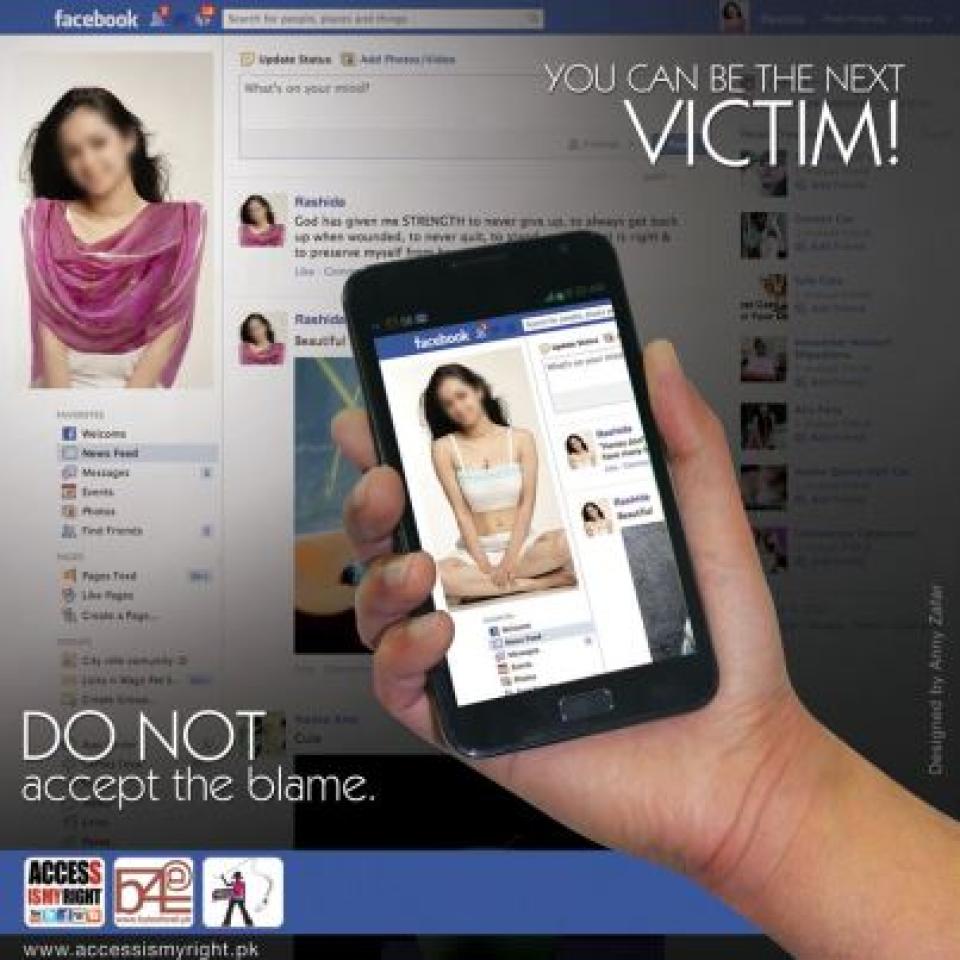
The Digital World 2012 – Knowledge to Prosperity conference in Dhaka, Bangladesh 6-8 December was an amazing mashup of private sector, government, education, and civil society united in their interest in ICT for development. As coordinator of APC’s End violence: Women’s rights and safety online project, Jan Moolman attended the meeting to present Take Back the Tech! in a session spotlighting tech-related violence against women and girls. Never before has a major national technological event spotlighted the elimination of violence against women as a priority.
Take Back the Tech’s global theme this year focussed on the sharing of stories and interestingly enough the session in Bangladesh began the same way, with two young women sharing their stories, one in English, one in Bangla, from behind a screen to maintain anonymity.
One was the story of a young university student who got repeated calls from a private number. It all started with a call saying “You know, I know a lot about you…” and continued, escalating in verbal abuse and threats over time. Finally a friend showed her how to block the number on her phone and the calls ceased. Another friend went through the same ordeal, but as her phone did not have that functionality, she was forced to change her number.
The second story shared how a neighborhood “union information center” was able to intervene in the community to insist that a boy who posted an inappropriate picture of a girl on Facebook take it down. She reported the problem in her community, at the center, even to Facebook but it was only by community pressure through the infocenter that the boy was discovered and took down the image. Unfortunately the trauma was such that the girl did try to take her life.
The session moderator, Prof. Dr. Yesmeen Hoque stated that technology, just like a hammer, can be used to break and it can be used to build. The focus on technologies’ ability to build and transform threaded throughout panelist’s presentations, starting with Ms. Syeda Yasmin Rahman who spoke about the uses of technology in women’s life cycles. She examined the different types of access to information that women might need at a given time, such as access to information about health, birth control and pregnancy; or the need for mobile access. She cited a programme that sends out vaccination alerts via cell phones to ensure child health. Rahman also saw technology as a way to have “flex-time” with distance work permitting women to juggle motherhood and labor roles. She drove home the importance of technology in women’s ability to make better choices.
After presenting Take Back the Tech!, Jan pointed out the interconnection between tech-related violence and violence against women in general, and everyone’s responsibility – as individuals and as society – to address it. She gave the example of “eve-teasing” or sexual harassment on the streets, and the kinds of consequences it has for women. She pointed out the parallels with a video produced by TBTT campaigner Colnodo in Colombia. In the video, written and produced by university students, one young man is challenged and admonished by another when he tries to show intimate pictures of a woman he got on the internet. The video talks about respect for women and the right to privacy and most of all questions a masculinity that violates such basic rights. “We need to bring awareness to our behaviour as users. I gave a direct message to the young men in the room, saying that they had a very important role to play in ending this kind of violence – be it eve-teasing or tech-related violence – by speaking out when they see it and stating that they will not do it.”
Shahzad Ahmad from Bytes for All spotlighted their Pakistan Take Back the Tech! campaign posters, sharing the stories behind each poster. Too often women and girls who experience tech-related violence are blamed – for example, for having dared to post a picture on Facebook. It doesn’t matter if the picture posted was altered, the women are still held responsible. The “Don’t accept the blame” poster tries to raise awareness that such violence is not the women’s fault, and girls should not withdraw from internet spaces. “If someone manipulates your image without your consent, you are the victim, and that is how people should see this – parents, peers and teachers,” Jan recounted.
Shahzad emphasized agency and the need for everyone to “take charge, take control” of their technology because it is in learning about technology that we will also learn how to be safe online. Similarly, Luna Shamsud Doha from Bangladesh Women in Technology shared their work with grassroots children in slum areas, where using technology intelligently means not only understanding the tech end but also being aware of the consequences of whatever you do online.
Shahana Siddiqui, speaking in Bangla, pointed out that cultures in Bangladesh are not cultures of silence yet when it comes to violence against women, silence reigns. Everyone knows but no one speaks. This means there is a lack of data and knowledge, underreporting of incidents and an inability to document cases. Furthermore, different kinds of women have different problems and different responses are necessary. For example in Bangladesh it is women garment workers who experience the highest level of sexual harassment. The new site infokosh.gov.bd/praggya is a one-stop hub for analysis, services, and information on violence against women.
The event was one of many simultaneous sessions and had a public of just over 100 people, yet the moderator shared updates of how many people were viewing the session from afar, starting with 7608 people watching and eventually growing to 21,552 viewers.
Sharing stories allows us to break down the myth that violence does not happen. Silences curtail the possibility of solutions. This what was so impressive for Jan as she shared her Bangladesh experience with such enthusiasm. The event wove together technology priorities from the private sector, students, government and civil society and unlike any other national tech event, it put the importance of ending violence against women up front and center, as everyone’s responsibility. “In our sessions we had so many students! I walked away with the sense that there is an entire generation of young people who really are present and concerned about violence. And they are the ones who are the future.”
—- end —-
“Don’t accept the blame” poster by Bytes for All, Pakistan.
- 10274 views






Add new comment